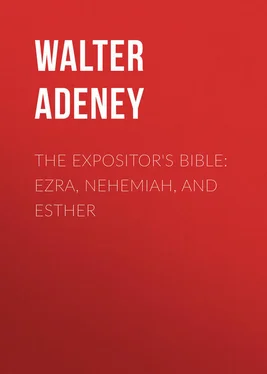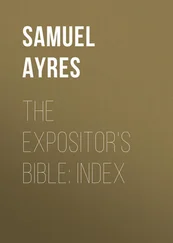Walter Adeney - The Expositor's Bible - Ezra, Nehemiah, and Esther
Здесь есть возможность читать онлайн «Walter Adeney - The Expositor's Bible - Ezra, Nehemiah, and Esther» — ознакомительный отрывок электронной книги совершенно бесплатно, а после прочтения отрывка купить полную версию. В некоторых случаях можно слушать аудио, скачать через торрент в формате fb2 и присутствует краткое содержание. Издательство: Иностранный паблик, Жанр: foreign_religion, foreign_antique, foreign_prose, на английском языке. Описание произведения, (предисловие) а так же отзывы посетителей доступны на портале библиотеки ЛибКат.
- Название:The Expositor's Bible: Ezra, Nehemiah, and Esther
- Автор:
- Издательство:Иностранный паблик
- Жанр:
- Год:неизвестен
- ISBN:нет данных
- Рейтинг книги:3 / 5. Голосов: 1
-
Избранное:Добавить в избранное
- Отзывы:
-
Ваша оценка:
- 60
- 1
- 2
- 3
- 4
- 5
The Expositor's Bible: Ezra, Nehemiah, and Esther: краткое содержание, описание и аннотация
Предлагаем к чтению аннотацию, описание, краткое содержание или предисловие (зависит от того, что написал сам автор книги «The Expositor's Bible: Ezra, Nehemiah, and Esther»). Если вы не нашли необходимую информацию о книге — напишите в комментариях, мы постараемся отыскать её.
The Expositor's Bible: Ezra, Nehemiah, and Esther — читать онлайн ознакомительный отрывок
Ниже представлен текст книги, разбитый по страницам. Система сохранения места последней прочитанной страницы, позволяет с удобством читать онлайн бесплатно книгу «The Expositor's Bible: Ezra, Nehemiah, and Esther», без необходимости каждый раз заново искать на чём Вы остановились. Поставьте закладку, и сможете в любой момент перейти на страницу, на которой закончили чтение.
Интервал:
Закладка:
Secondly, the resident neighbours fell in with the recommendation of the king ungrudgingly, and gave rich contributions for the expedition. They could not go themselves, but they could have a share in the work by means of their gifts – as the home Church can share in the foreign mission she supports. The acceptance of these bounties by the Jews does not well accord with their subsequent conduct when they refused the aid of their Samaritan neighbours in the actual work of building the temple. It has an ugly look, as though they were willing to take help from all sources excepting where any concessions in return would be expected on the part of those who were befriending them. However, it is just to remember that the aid was invited and offered by Cyrus, not solicited by the Jews.
Thirdly, the execution of the decree appears to have been honestly and effectively promoted by its author. In accordance with his generous encouragement of the Jews to rebuild their temple, Cyrus restored the sacred vessels that had been carried off by Nebuchadnezzar on the occasion of the first Chaldæan raid on Jerusalem, and deposited in a temple at Babylon nearly seventy years before the time of the return. No doubt these things were regarded as of more importance than other spoils of war. It would be supposed that the patron god of the conquered people was humiliated when the instruments of his worship were offered to Bel or Nebo. Perhaps it was thought that some charm attaching to them would bring luck to the city in which they were guarded. When Nabonidas was seized with frantic terror at the approach of the Persian hosts, he brought the idols of the surrounding nations to Babylon for his protection. The reference to the temple vessels, and the careful and detailed enumeration of them, without the mention of any image, is a clear proof that, although before the captivity the majority of the Jews may have consisted of idolaters, there was no idol in the temple at Jerusalem. Had there been one there Nebuchadnezzar would most certainly have carried it off as the greatest trophy of victory. In default of images, he had to make the most of the gold and silver plate used in the sacrificial ceremonies.
Viewed in this connection, the restitution of the stolen vessels by Cyrus appears to be more than an act of generosity or justice. A certain religious import belongs to it. It put an end to an ancient insult offered by Babylon to the God of Israel; and it might be taken as an act of homage offered to Jehovah by Cyrus. Yet it was only a restitution, a return of what was God's before, and so a type of every gift man makes to God.
It has been noticed that the total number of the vessels restored does not agree with the sum of the numbers of the several kinds of vessels. The total is 5400; but an addition of the list of the vessels only amounts to 2499. Perhaps the less valuable articles are omitted from the detailed account; or possibly there is some error of transcription, and if so the question is, in which direction shall we find it? It may be that the total was too large. On the other hand, in 1 Esdras nearly the same high total is given – viz., 5469 – and there the details are made to agree with it by an evidently artificial manipulation of the numbers. 12 12 1 Esdras ii. 14.
This gives some probability to the view that the total is correct, and that the error must be in the numbers of the several items. The practical importance of these considerations is that they lead us to a high estimate of the immense wealth of the Old Temple treasures. Thus they suggest the reflection that much devotion and generosity had been shown in collecting such stores of gold and silver in previous ages. They help us to picture the sumptuous ritual of the first temple, with the "barbaric splendour" of a rich display of the precious metals. Therefore they show that the generosity of Cyrus in restoring so great a hoard was genuine and considerable. It might have been urged that after the treasures had been lying for two generations in a heathen temple the original owners had lost all claim upon them. It might have been said that they had been contaminated by this long residence among the abominations of Babylonian idolatry. The restoration of them swept away all such ideas. What was once God's belongs to Him by right for ever. His property is inalienable; His claims never lapse with time, never fail through change.
It is not without significance that the treasurer who handed over their temple-property to the Jews was named "Mithredath" – a word that means "given by Mithra," or "devoted to Mithra." This suggests that the Persian sun-god was honoured among the servants of Cyrus, and yet that one who by name at least was especially associated with this divinity was constrained to honour the God of Israel. Next to Judaism and Christianity, the worship of Mithra showed the greatest vitality of all religions in Western Asia, and later even in Europe. So vigorous was it as recently as the commencement of the Christian era, that M. Renan has remarked, that if the Roman world had not become Christian it would have become Mithrastic. In those regions where the dazzling radiance and burning heat of the sun are felt as they are not even imagined in our chill, gloomy climate, it was naturally supposed that if any visible God existed He must be found in the great fiery centre of the world's light and life. Our own day has seen the scientific development of the idea that the sun's force is the source of all the energy of nature. In the homage paid by one of the ancient followers of Mithra, the sun-god, to the God of Israel, may we not see an image of the recognition of the claims of the Supreme by our priests of the sun – Kepler, Newton, Faraday? Men must be more blind than the slaves of Mithra if they cannot recognise an awful, invisible energy behind and above the forces of the solar system – nay more, a living Spirit – God!
CHAPTER IV.
THE SECOND EXODUS
The journey of the returning exiles from Babylon has some points of resemblance to the exodus of their fathers from Egypt. On both occasions the Israelites had been suffering oppression in a foreign land. Deliverance had come to the ancient Hebrews in so wonderful a way that it could only be described as a miracle of God: no material miracle was recorded of the later movement; and yet it was so marvellously providential that the Jews were constrained to acknowledge that the hand of God was not less concerned in it.
But there were great differences between the two events. In the original Hegira of the Hebrews a horde of slaves was fleeing from the land of their brutal masters; in the solemn pilgrimage of the second exodus the Jews were able to set out with every encouragement from the conqueror of their national enemy. On the other hand, while the flight from Egypt led to liberty, the expedition from Babylon did not include an escape from the foreign yoke. The returning exiles were described as "children of the province" 13 13 Ezra ii. 1.
— i. e. , of the Persian province of Judæa – and their leader bore the title of a Persian governor. 14 14 Tirshatha. Ezra ii. 63.
Zerubbabel was no new Moses. The first exodus witnessed the birth of a nation; the second saw only a migration within the boundaries of an empire, sanctioned by the ruler because it did not include the deliverance of the subject people from servitude.
In other respects the condition of the Israelites who took part in the later expedition contrasts favourably with that of their ancestors under Moses. In the arts of civilisation, of course, they were far superior to the crushed Egyptian bondmen. But the chief distinction lay in the matter of religion. At length, in these days of Cyrus, the people were ripe to accept the faith of the great teachers who hitherto had been as voices crying in the wilderness. This fact signalises the immense difference between the Jews in every age previous to the exile, and the Jews of the return. In earlier periods they appear as a kingdom, but not as a Church; in the later age they are no longer a kingdom, but they have become a Church. The kingdom had been mainly heathenish and idolatrous in its religion, and most abominably corrupt in its morals, with only a thin streak of purer faith and conduct running through the course of its history. But the new Church, formed out of captives purified in the fires of persecution, consisted of a body of men and women who heartily embraced the religion to which but few of their forefathers had attained, and who were even ready to welcome a more rigorous development of its cult. Thus they became a highly developed Church. They were consolidated into a Puritan Church in discipline, and a High Church in ritual.
Читать дальшеИнтервал:
Закладка:
Похожие книги на «The Expositor's Bible: Ezra, Nehemiah, and Esther»
Представляем Вашему вниманию похожие книги на «The Expositor's Bible: Ezra, Nehemiah, and Esther» списком для выбора. Мы отобрали схожую по названию и смыслу литературу в надежде предоставить читателям больше вариантов отыскать новые, интересные, ещё непрочитанные произведения.
Обсуждение, отзывы о книге «The Expositor's Bible: Ezra, Nehemiah, and Esther» и просто собственные мнения читателей. Оставьте ваши комментарии, напишите, что Вы думаете о произведении, его смысле или главных героях. Укажите что конкретно понравилось, а что нет, и почему Вы так считаете.












